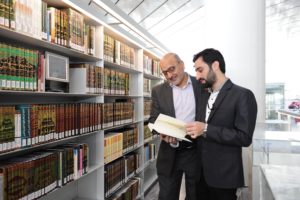The Madrasa Discourses project proposes that a conciliation of traditional Islamic thought with contemporary scientific and philosophical worldviews can result in orthodox affirmations of human dignity that are essential for peaceful coexistence in a pluralistic world. The educational curriculum presented here seeks to enable traditional Muslim scholars (ʿulamāʾ) to update their tradition by deepening their theological and scientific literacy. Emerging from a project that has engaged over one hundred young religious leaders through an intensive course of virtual and in-person study, this Madrasa Discourses curriculum is envisioned as a modest step in the effort to revitalize the intellectual culture of Muslim societies.
History of the Project

Dr. Moosa with a Madrasa Discourses student at the Qatar National Library, December 2017.
“Do something for the next generation of young ʿulamāʾ.”
Dr. Ebrahim Moosa, himself a madrasa graduate before becoming a professor of Islamic Studies, sought to honor this plea from the Indian Fiqh Academy of India. He too had seen the challenges the new generation of Muslim religious leaders faced in trying to answer contemporary questions with static curricula. When he arrived at the University of Notre Dame, he finally saw his chance. With the support of the John Templeton Foundation, Dr. Moosa realized a multi-year curriculum that would draw on the rich resources of the Islamic tradition while not shying away from the philosophical challenges posed by new cosmologies and new technologies.
Starting with a select group of thirty recently certified madrasa graduates in the spring and summer of 2017, the Madrasa Discourses project offered a transformative three-year educational experience with far-reaching consequences. It provided the tools, experiences, and intellectual resources to appreciate the virtues of a cosmopolitan outlook consistent with the highest Islamic ideals and in tune with the social and political imperatives of peaceful coexistence in a multifaith and multicultural world. The project equipped its graduates, future leaders and scholars, to deal with a rapidly globalizing world in the information and digital age.
The ulamā provide crucial religious guidance in values and everyday practice to Muslims around the world. They are the custodians of traditional learning in Muslim societies, helping shape the social and cultural outlook of their communities. Upgrading the capacity of these theologians could have a multiplier effect on millions. A transformative impact on the ʿulamāʾ, and by extension, on Muslim societies beyond South Asia, is a long-term goal of this project.
The Madrasa Discourses Curriculum
This web page presents the curriculum developed by Islamic Studies experts and refined through countless classroom hours with madrasa graduates from around the world. We share this material free of charge in the hopes that it may reach and inspire those who seek to apply their own Islamic learning to the questions of a technologically adept, multicultural future.
Envisioned as a course moving from history to science to theology (or past to present to future), the program hopes to engender creative thinking among students whereby they begin to see their own tradition as part of a larger human and inter-civilizational conversation around great questions on the origin and purpose of life. They will perceive tradition as something that is constructed in history by independent thinkers who used the most advanced intellectual tools at their disposal to interpret scripture in light of contemporary ideas, philosophies, and worldviews. By the end of the course, students will be on their way to thinking creatively in order to articulate Islamic thought using terms and concepts relevant to contemporary intellectual currents and modern global concerns.
To read more about the renewal of Islamic thought, we invite you to read “Contending Modernities Goes to the Madrasa” and “Madrasa Graduates: Children of Abraham and Aristotle.”
Meet the Team
The Madrasa Discourses project is led by Primary Investigator Dr. Ebrahim Moosa. Dr. Mahan Mirza was lead faculty from 2016-2019, and Dr. SherAli Tareen and Dr. Josh Lupo have carried on since 2019 as US lead faculty and Classroom Coordinator. Dr. Waris Mazhari and Dr. Ammar Khan Nasir serve as lead faculty in India and Pakistan, respectively. Visit the Madrasa Discourses Team page to learn more about each faculty member and what drew them to the project. The project is housed at the Contending Modernities research initiative at the Kroc Institute for International Peace Studies, Keough School of Global Affairs, at the University of Notre Dame.


